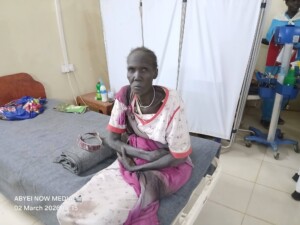ACJPS condemns human rights violations by Sudan’s armed forces
A report by the African Centre for Justice and Peace Studies (ACJPS) between March and May indicates that members of the Sudanese army and the Rapid Support Forces militia continue to violate human rights in the country. The Human Rights and Development Organisation (HUDO) reported yesterday that a Nuba farmer detained by army soldiers on April 11 is still being held incommunicado.
 Rapid Support Forces parading at the Karari base in Omdurman, 15 December 2014 (File photo)
Rapid Support Forces parading at the Karari base in Omdurman, 15 December 2014 (File photo)
A report by the African Centre for Justice and Peace Studies (ACJPS) between March and May indicates that members of the Sudanese army and the Rapid Support Forces militia continue to violate human rights in the country. The Human Rights and Development Organisation (HUDO) reported yesterday that a Nuba farmer detained by army soldiers on April 11 is still being held incommunicado.
In its report on Thursday, ACJPS points to April 12 last year, when thousands of Sudanese across the country and in diaspora celebrated the release of hundreds of the detainees held for actual or indirect participation in the protests that led to the ousting of former President Omar Al Bashir after 30 years of ruling.
Many believed that the practice of arbitrary arrest and torture manifested in Al Bashir’s regime had come to end, however, an ACJPS monitoring report from March to May this year indicates that members of the army and the RSF have continued to violate the human rights of the Sudanese.
Arbitrary detention
On March 5, an RSF officer in Khartoum held human rights defender Abdelmalik Mousa at the El Soug El Arabi in central Khartoum. He was detained while he was heading to seek legal consultation from a lawyer regarding the case of former Janjaweed leader Musa Hilal and 250 militiamen of the Border Guards held between August and December 2017.

The lawyer was released after a group of colleagues submitted a complaint to the office of the Attorney General in Khartoum.
ACJPS states that a month later, on April 8, a group of RSF officers in Blue Nile state detained Idris El Bur, a 37-year old blogger and member of the Sudanese Baath Party.
He was held after sharing a post on his Facebook account where he accused the management of a petrol station owned by Maj Faiz Balla, Commander of the RSF in Blue Nile state, for selling fuel above the official prices set by the Sudanese authorities.
El Bur was detained at the RSF headquarters in Ed Damazin and released on April 11, but was re-detained in end April after attempting to file a complaint about his first detention at the office of the attorney general in Blue Nile state.
On May 4, El Agib Mohamed, a 45-year old driver of a motorcycle, was beaten-up by ten SAF and RSF soldiers at a fuel station in Kenana.
He was beaten after he complained about the mistreatment of people by SAF officers deployed at the fuel station. There were long queues due to the shortage of fuel. Following the beating, Mohamed was also forced out of the queue where he had been waiting for about four hours to buy fuel.
Judicial strike
ACJPS further points to the call of Chief Justice Nemat Abdallah on the judiciary in the country to lay down their tools on March 26, after a judge of the El Faw general court in El Gedaref was beaten by two army officers at a petrol station in town, after he identified himself as a judge.
The strike by the judiciary ended after Abdelfatah El Burhan, Chairman of the Sovereign Council, promised in a meeting with Abdallah to follow-up the matter and hold perpetrators to account.
Incommunicado
Radio Dabanga reported on April 15 that 42-year old farmer El Safi El Degein was held by army soldiers in South Kordofan four days before. He was taken to the army base in Talodi, 55 kilometres from his home. No reason was given for his detention. His family and lawyers have not been allowed to visit him.
A reliable source informed the Sudanese Human Rights and Development Organisation (HUDO) that the farmer’s detention is related to his political activities in the past.
HUDO reported on Thursday that El Degein is still being held. The human rights organisation fears for his well-being. “He is likely to be undergoing torture.”
The organisation calls on the Sudanese government “to unconditionally release or send him to a court of law”. In addition, Khartoum should end the State of Emergency in South Kordofan which enables the army and militias to carry out detentions at will against the people living in the region.
Torture
Sudan’s 2019 Constitutional Charter for the Transitional Period prohibits torture and ill treatment. Article 50 clearly states that “No one may be subjected to torture or harsh, inhumane, or degrading treatment or punishment, or debasement of human dignity.
The use of torture across Sudan however, has been endemic during the last three decades, and it needs serious steps to counter the practices.
“Sudanese authorities have used torture and other forms of ill-treatment to intimidate and silence political dissent. The periods of protests both before and after Al Bashir’s ouster in April 2019 was marked by serious human rights violations against protesters,” ACJPS states.
“Several peaceful protesters were arbitrarily detained and subjected to torture and other ill-treatments for actual or suspected participation in the protests. Testimonies documented by ACJPS indicate that several detainees were subjected to torture.”
The African Centre calls on Sudan’s transitional government to end the arbitrary arrests and detention, and the practice of torture by both state and non-state actors.
The government should take law reform as a priority, ratify the international Convention Against Torture, and enact a law against torture in Sudan.
In February, Human Rights Watch (HRW) also urged Sudan’s new government to accelerate legal and institutional reform.
Radio Dabanga’s editorial independence means that we can continue to provide factual updates about political developments to Sudanese and international actors, educate people about how to avoid outbreaks of infectious diseases, and provide a window to the world for those in all corners of Sudan. Support Radio Dabanga for as little as €2.50, the equivalent of a cup of coffee.












 and then
and then